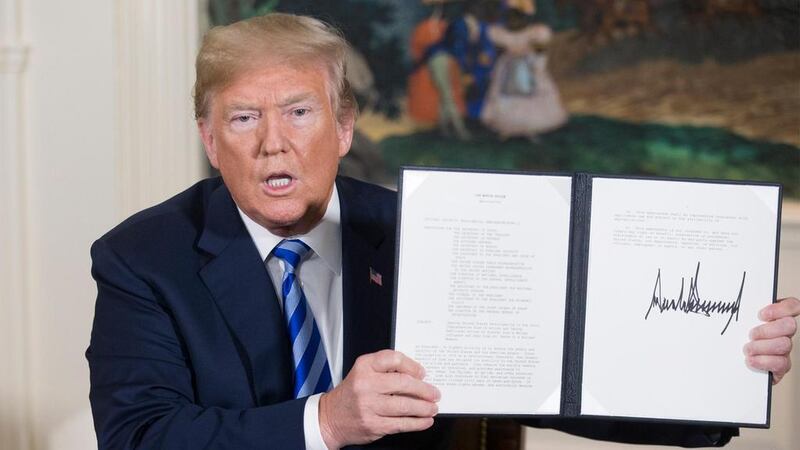The United States on Monday reimposed financial sanctions on Iran that were suspended under the nuclear deal in 2015, while renewing President Donald Trump’s offer to meet his Iranian counterpart, Hassan Rouhani.
Mr Trump signed an executive order reintroducing financial sanctions on Iran and sent a letter to the leaders of Congress notifying them of changes, as required by US law. "Consistent with President Trump’s decision, the administration will be reimposing specified sanctions after August 6, the final day of the 90-day wind-down period,” the White House said.
In a tweet Mr Trump said anyone doing business with Iran will not be allowed to trade with the US, reinforcing the pressure for European Union allies to completely disengage with the country.
The sanctions, which take effect at midnight on Monday in Washington, bar transactions with Iran in US currency, gold, precious metals, graphite, coal and semi-finished metals, as well as large sales of Iranian rials, issuing Iranian debt and car sanctions. US imports of food and carpets from Iran are also restricted.
_______________
Read more:
Iran confirms holding war drills in Gulf
Iran preparing currency rescue plans as US sanctions return
Explainer: the collapse of the Iranian rial
_______________
Other suspended sanctions that will be reimposed on November 4 will target the energy, shipping and insurance sectors, and the central bank of Iran.
Senior US officials said at a briefing on Monday that the plan was to increase economic pressure on Tehran to have “an exponential effect on Iran’s already fragile economy”.
The threat of sanctions has already weakened Iran’s hand, one official said. “The riyal is tanking, unemployment in Iran is rising, and there are widespread protests over social issues and labour unrest.”
The Iranian rial hit a new low of 111,000 to the US dollar last week, as more labour strikes and protests were reported on social media.
At the same time, Mr Trump is willing to meet Iranian leaders "at any time" to discuss "a real comprehensive deal that will contain their regional ambitions, will end their malign behaviour, and deny them any path to a nuclear weapon", the officials said.
US National Security Adviser John Bolton said Iran “could take up the president’s offer to negotiate with them, to give up their ballistic missile and nuclear weapons programmes fully and really verifiably — not under the onerous terms of the Iran nuclear deal, which really are not satisfactory.
"If Iran were really serious they'd come to the table. We'll find out whether they are or not," he said on Fox News.
Asked about threats to close the Strait of Hormuz, Mr Bolton said that would be Iran's "worst mistake yet”.
However, he downplayed the possibility. “I don't think that they are serious about it ... I think they are still bluffing," he said.
Trump government officials blame the nuclear deal signed under former president Barack Obama for providing the revenue for Iran to fund its regional activities.
“Looking at the region from Yemen to Syria to Gaza, the Iranian regime is using the resources they had got from the Joint Comprehensive Plan of Action [the official name of the 2015 deal] to spread human misery across the region, instead of investing it in their people at home,” an official said.
But experts disagree on the impact of renewed sanctions. Behnam Ben Taleblu of the Foundation for Defence of Democracies said they “signal that the administration is serious in its intent to recreate the leverage that existed between the US and Iran prior to the nuclear deal”.
They aim "both to coerce Tehran to change its behaviour, as well as to maintain the deterrent power of secondary sanctions" in targeting non-US companies doing business with Tehran, Mr Taleblu told The National.
US officials estimate that nearly 100 international companies have announced their intent to leave the Iranian market, particularly in the energy and the finance sectors, he said. Renault, Total, Peugeot, General Electric, Boeing, Hyundai, Mazda, IndusInd Bank and other major companies have either left Iran or asked their investors to do so before the return of US sanctions.
Those sanctions will have a greater effect now than when they were imposed before the nuclear deal, he said, because “unlike a decade ago, banks and businesses have significantly grown their compliance sectors and are more weary of American secondary sanctions and the risks of doing businesses with Iran”.
Mr Taleblu expected 2019 to be the year to see the aggregated effect of the sanctions.
But Ali Vaez, the director of the Iran Project at the International Crisis Group, warned against inflating the impact of the new sanctions. "The chilling effect of these sanctions has already taken its toll on the Iranian economy, so the sky will not fall at midnight tonight," he told The National.
“The Iranian economy will undoubtedly shrink but if past is prologue, Iran is not going to change its regional policies even if it falls into a recession,” he said.
Mr Vaez also dismissed the possibility of a Trump-Rouhani meeting.
“No Iranian politician can risk negotiating with the president who trashed the outcome of 12 years of negotiations over the nuclear issue and can't come to any lasting agreement with his own party and US's traditional allies,” he said.
US trade with Iran stood at $258 million (Dh948m) in 2016, according to the US Census Bureau, while exports to Iran from the European Union, which will be affected by secondary sanctions, were worth $13 billion last year.






